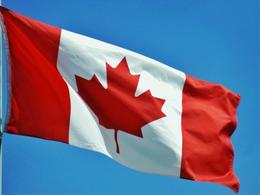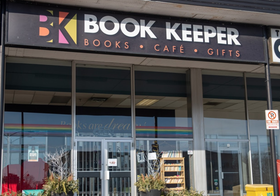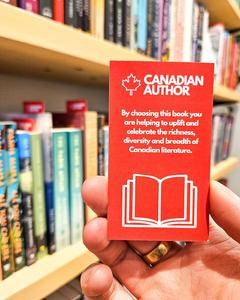 I live just outside a city in upstate New York. When I drive the four or five miles from my house over to the entrance ramps for Interstate 87, there are two large green signs, offering me alternative destinations: Albany to the south and Montreal to the north. Canada is, if not quite "just up the road," then close enough to feel like the next stop. So when the on-again off-again tariffs news broke recently, my neighbor was on the radar even more than it usually is.
I live just outside a city in upstate New York. When I drive the four or five miles from my house over to the entrance ramps for Interstate 87, there are two large green signs, offering me alternative destinations: Albany to the south and Montreal to the north. Canada is, if not quite "just up the road," then close enough to feel like the next stop. So when the on-again off-again tariffs news broke recently, my neighbor was on the radar even more than it usually is.
"With the new tariffs coming into effect, we want to remind you to shop local and please support your locally-owned businesses," The Book Keeper, Sarnia, Ont., posted on social media. "While many of these small businesses continue to learn and navigate what this means for them and their customers (including us) it’s clear to assume that big corporations like our biggest Canadian competitor are more easily able to absorb these extra costs and negotiate better deals with their suppliers with their gigantic purchasing power. Small businesses? Not so much."
 Independent Canadian book publishers "face escalating costs and rampant confusion" as they navigate Trump's proposed 25% tariffs "at a moment in which they also feel squeezed by major multinationals and fearful of public funding cuts," the Globe & Mail reported.
Independent Canadian book publishers "face escalating costs and rampant confusion" as they navigate Trump's proposed 25% tariffs "at a moment in which they also feel squeezed by major multinationals and fearful of public funding cuts," the Globe & Mail reported.
Even with the current 30-day pause, publishers must contend with the uncertainty driven by long lead times required to price, print, and ship books. Douglas & McIntyre and Harbour Publishing proactively moved inventory across the border and are reconsidering where to print their books, the Globe & Mail noted, adding that Nimbus Publishing and Vagrant Press are weighing whether absorbing any added cost would make it worth selling some titles in the U.S.
"If we raise the price beyond what the market can bear, and then there is no tariff, two months from now when the book ships, we've kind of screwed ourselves," said David Caron, co-publisher of ECW Press.
Norm Nehmetallah, publisher of Invisible Books, said, "If I have to send, say, 1,000 books from the printer to the U.S. warehouse, if I'm literally going to get a bill in the mail for 25% of the manufacturing cost of those books, then probably we're done shipping books to the U.S."
Noting BookNet Canada has previously reported that Canadian-owned publishers account for a small percentage of sales of English-language print trade books, ECW's Caron told the Globe & Mail that this was evidence of a trade deficit favoring the U.S.: "Far more American books are sold in Canada than Canadian books are sold in the U.S."
Jack Illingworth, executive director of the Association of Canadian Publishers, said he was still analyzing the technical details ahead of potential tariffs: "Is the tariff going to be on the manufacturing cost of the book, or the discounted cost at which it's sold to a bookseller, or on the full retail cost? Due to the way the Trump administration has rolled this out, answers are pretty thin. I think we're all prepared for a massive slowdown of trade across the border as they actually work these kinks out."
Canada's list of goods that will face retaliatory tariffs does not yet include books, but the government could expand that list in three weeks, depending on the situation then.
Cross and Crows Books, Vancouver, B.C., offered some momentary reassurance for its customers in a social media post: "When a question is asked five times in a day, it is worthy of a post. At present, books are not included in the new tariffs. Books typically are regarded in trade agreements as a type of socially and morally important cultural property that should not be subject to tariff or duty. Since many books sold in Canada (even titles by Canadian authors or published by Canadian branches of U.S. publishers) are warehoused and distributed in the U.S., this is a good thing. So yes, books ordered from the U.S. are still coming!"
Noting that it is "proudly Canadian-Owned and proudly support Canadian authors every chance we get," the Book Keeper posted: "The vast majority of our author events that we bring to Sarnia are Canadian authors. We employ local people who spend their money locally, and we also have small business entrepreneurs working on our staff. It’s a stressful time to be a small, local business owner who is responsible for supporting their staff while facing unknown financial implications of a trade war. We commit to shopping local and shopping Canadian and we hope you will too. To those who continue to support us--we love you all! Thank you!"
 In recent days, many indie booksellers have been showcasing Canadian writers in their social media posts, including the Spaniel's Tale Bookstore, Ottawa, Ont., which highlighted "Canadian Author" cards: "You may have seen these in the store before while perusing the shelves. We've always believed in supporting Canadian authors. That's true now more than ever. Independent bookstores are proud to punch above their weight when it comes to supporting Canadian authors and publishers. Indies often shop local themselves and sell a higher proportion of Canadian authored books than the chains and American-owned Amazon. Nearly one quarter of the books sold at the Spaniel's Tale in 2024 were Canadian-authored, compared to just 12% across the industry overall."
In recent days, many indie booksellers have been showcasing Canadian writers in their social media posts, including the Spaniel's Tale Bookstore, Ottawa, Ont., which highlighted "Canadian Author" cards: "You may have seen these in the store before while perusing the shelves. We've always believed in supporting Canadian authors. That's true now more than ever. Independent bookstores are proud to punch above their weight when it comes to supporting Canadian authors and publishers. Indies often shop local themselves and sell a higher proportion of Canadian authored books than the chains and American-owned Amazon. Nearly one quarter of the books sold at the Spaniel's Tale in 2024 were Canadian-authored, compared to just 12% across the industry overall."
Brome Lake Books, Knowlton, Que., noted: "We have started a collection of Canadian authors with books printed in Canada. More to come! Stay tuned! Here is a link to the list on our webpage."
And Cedar Canoe Books, Huntsville, Ont., extended an invitation: "Looking for more way to support Canadian authors and businesses? We can help with that!"

